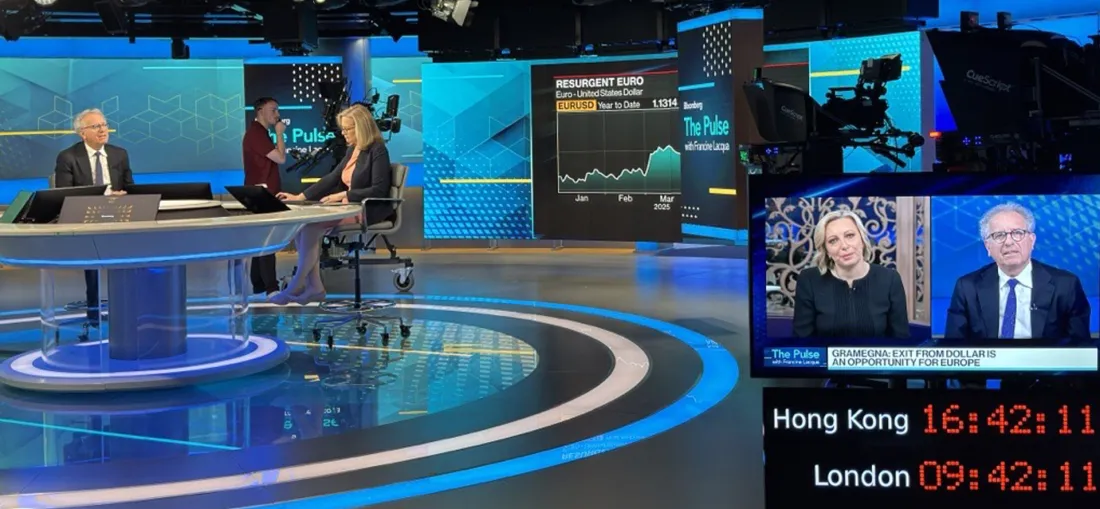Pierre Gramegna in interview with Bloomberg TV The Pulse

Transcript of interview with Pierre Gramegna, ESM Managing Director
Bloomberg TV, The Pulse, 22 May 2025
Interviewer: Francine Lacqua
Bloomberg TV: We're hearing that some countries in Europe are pushing back against ratifying a new ESM Treaty. Could you confirm that and what's being done to convince them to do otherwise?
Pierre Gramegna: First of all, thanks for giving me the opportunity to speak here. We have a revised treaty which is pending because one country is not ratifying. That is not a new situation, and unfortunately, it's not evolving. But this is not dramatic in the sense that we have the founding treaty that is in place. And so we have all our financial instruments available in case of necessity. What is not in place is a backstop to the fund to rescue banks [the Single Resolution Fund], which has been benefitting from contributions of banks themselves. So that backstop is not in place, but all the rest is in place.
Have you spoken to the Italians recently? And is there a way of convincing them? And what do you do if they don't budge?
We are speaking on a regular basis with the Italian government. On the other hand, we have to respect democracy and the rule of law. So a treaty can only enter into force if it is ratified by all countries. So it's up to the Italians to find a way to ratify. If there is no political willingness, so be it, but it is not preventing us from being active, if necessary.
Do you worry at all about the firepower of the ESM, or whether any remit could be changed?
In fact, we have a firepower of €500 billion, out of which €427 billion is available. And this is extremely useful in these challenging times with geopolitical tensions, with wars that haven't seen for a long time. So all of this is creating a lot of uncertainty. The European Central Bank declared yesterday that the geopolitical uncertainty and also tariff issues worldwide are a danger to financial stability. And let's face it, financial stability is good for peace. And we in a time of less peace. So obviously this has an impact. And so we're following that very closely. Our role is also to step in eventually for the 20 euro area member countries in case of risks to financial instability. So not only in case of crisis resolution, but also having a prevention role. These are tools that we have, similar to what the International Monetary Fund has, and it's good to have that available.
So how much push do you think will come from certain countries, maybe France, maybe others, to make sure that Europe doesn't regulate too much, that it follows maybe the path of the US and the UK in terms of deregulation? And could you see instability risks arising from that?
I think there has been recognition by the Commission and by all Member States of the EU that there has been overregulation and the pendulum has gone too far in one direction; it is now coming back. And the goal is not complete, the regulation is simplification. And the Omnibus directive of the Commission on deregulation, which is called simplification, is on its way. And it's encompassing lots of things. I think it shows the determination of Europe to be more business-friendly without compromising essential issues like climate change or others.
Mr Gramegna, it's very clear that the Trump administration is actually in full support of cryptocurrencies. What does that mean for Europe?
The jury is out what will come out of the executive orders or the laws that are in preparation in the United States. We're following this very closely in the Eurogroup. We're following this very closely as ESM, as a lender of last resort. We are obviously looking at all the things that could have an impact on the euro area. And depending how the regulation on cryptocurrencies or on stablecoins is going to be, it could have an impact on the euro area, in terms of our autonomy or currency. It could encourage private companies to issue stablecoins. There were initiatives like that in the past that the United States itself did not support. So it needs to be seen if this is the direction in which it's going. I would not like to speculate on it for the time being, but it's something that is on the radar screen of all European governments.
We talk a lot about US exceptionalism and whether this is only a bump in the road to more US supremacy, or whether there's actually a declination of US exceptionalism, and whether Europe, for example, could play a bigger role with the euro as a reserve currency. Is now the time for Europe to make that decision and push it forward if that's what they want?
The quick answer to that is definitely yes. We've seen in the last month that the markets are worried about the status of the dollar as the [safe] haven currency in the world. For many reasons, the unpredictability of the US administration, the tariff issues, now recently, the last budget proposals, all of this is producing some pushback by markets. I was at the IMF spring meetings recently, a couple of weeks ago, and all the players told us: this is an opportunity for Europe. Investors are looking for places that are stable, resilient, that have the rule of law, that are open to trade. This is really what we have in Europe. So it is definitely an opportunity for us, if we do our homework.
And the homework means implementing the savings and investment union, which is also in the Letta report. And we, as ESM, are an actor in this, in making proposals. We will have a conference on this in the weeks to come, in June. There are concrete things and steps that we can take in the short term, like securitisation, which has been left behind in Europe. We need pension products that need to be incentivised, so there are lots of ideas on the table of things that we can do quickly. But you know Europe can only move step by step. It is sometimes slow, but it is very efficient in the end.
Author

Contacts


